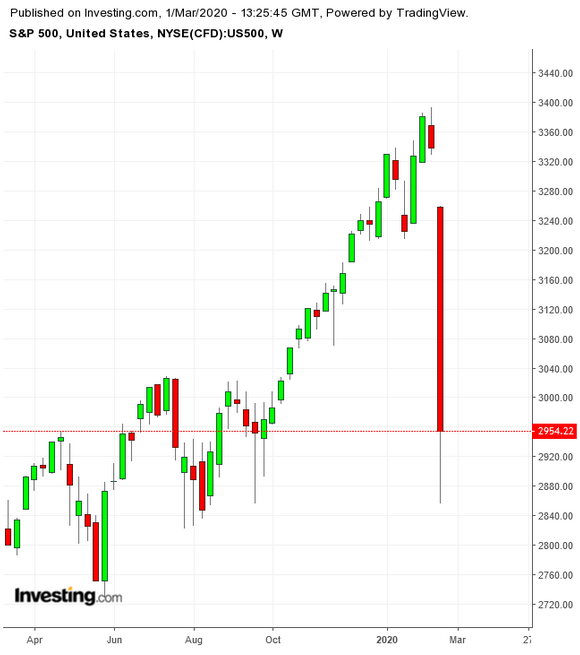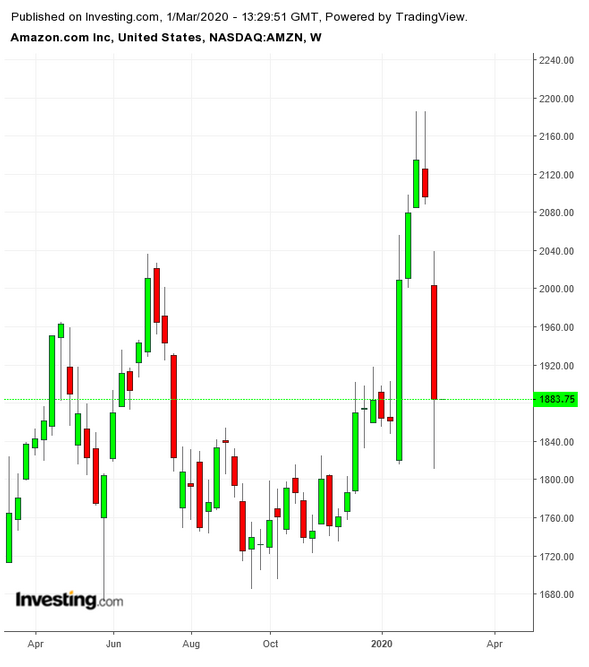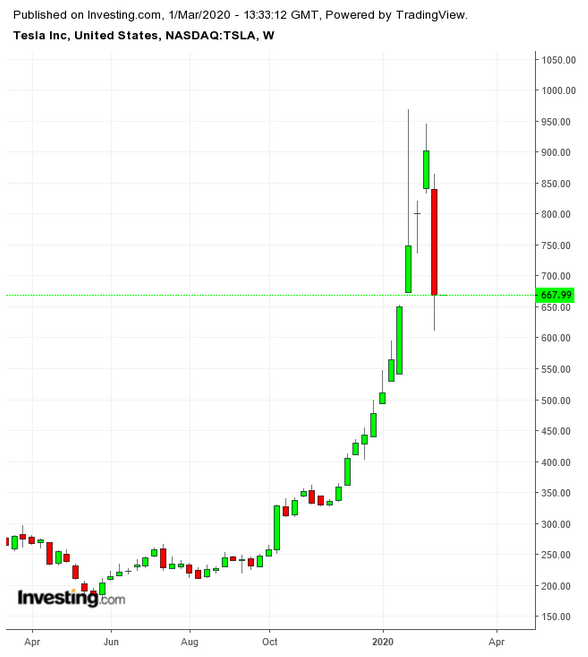If, in mid-February, you'd asked anyone on Wall Street where markets were headed next, you'd probably have been told—with great confidence—that equities were likely headed to yet more new all-time highs. Had you predicted that financial markets would be tanking, you'd surely have been mocked.
Yet as February came to a close, that's precisely what was happening: investors have been seing a shockingly deep pullback, something that the basic numbers don't quite show.

As an example, the S&P 500 ended the month off 8.4%. But the decline from its 52-week high on Feb. 19 was nearly 13%.
Worst Weekly Losses Since October 2008
In fact, the major indices last week suffered their severest weekly losses since October 2008, when markets were in the throes of the worst financial crisis this century. February's overall performance was the worst showing for the month since February 2009, right before the stock market bottomed. Plus, after mid-February of this year, all three major averages saw decent gains for the young 2020 completely disappear.
The S&P 500 lost 11.5% last week alone. The Dow Jones Industrials suffered a 12.4% loss for the week and ended the month down 10.1%, off nearly 11% this year. The NASDAQ Composite dropped 10.5% for the week, ending February down 6.4%, lower by 4.5% for the year.
In early February there were four U.S. companies with market capitalizations above $1 trillion: Apple (NASDAQ:AAPL), Microsoft (NASDAQ:MSFT), Google-parent Alphabet (NASDAQ:GOOGL) and Amazon.com (NASDAQ:AMZN).

By the end of the month, Alphabet and Amazon had fallen below $1 trillion again.
But tech stocks staged an impressive rally off their lows on Friday, with Apple and Microsoft both finishing with gains for the day, suggesting a rebound could occur this coming week. Still, Energy and Financial stocks, which were badly damaged last week, also need to recover.
The ostensible catalyst of this mess was the coronavirus (or Covid-19), the influenza-like illness that has spread across the globe from China. The first known death in the United States occurred Saturday in the Seattle area. The announcement a week ago, that the disease had hit Italy, set off this past week's panic.
Nevertheless, the epidemic is only part of this story. The coronavirus was simply the trigger that knocked the legs out from overbought markets around the world, especially the United States.
Energy Shares Slump; Some Biotechs Gain
One could see in January and again in February that the major indices were hitting technical levels that strongly signaled they were overbought. The NASDAQ's relative strength index (a measure of momentum) was above 70 for 15 of 21 days in January and another five in February.
And U.S. equities weren't alone. Stocks in Japan, Germany, the United Kingdom, France and Brazil each fell at least 8% for the month.
There's a third mechanical idea to consider: that the selloff was prompted by the Federal Reserve reducing the size of its interventions in the money markets, forcing a number of hedge funds to reduce their positions.
Some of the losses from 52-week highs were stunning. Tesla (NASDAQ:TSLA) peaked at $868.99 on Feb. 4, an astounding 125.8% gain for the year.

The stock closed Friday at $667.99, down 31.1% from its peak. Nevertheless, at least it's still up 59.7% for the year.
Apple and Microsoft lost a combined $424.5 billion in market capitalization between their closing highs on Feb. 12 and Feb. 11, respectively, and Friday. (They're both still up slightly on the year.)
Those declines are only 8% larger than the combined market caps for Exxon Mobil (NYSE:XOM) and Chevron (NYSE:CVX). The oil and gas supermajors are part of the sector with the biggest losers in February, energy stocks, a result of the steep dive in oil prices.
The Energy Select Sector SPDR® Fund (NYSE:XLE) fell 15.3% last week, and is off nearly 25% for the year. Exxon Mobil fell more than 17%; Chevron dropped 12.9%
Brent, the global benchmark, fell nearly 13% in February. Its $49.67 close Friday was the lowest finish for the commodity since July 2017; it's off more than 24% this year. West Texas Intermediate, down more than 13% for the week, is off 26.7% since the start of 2020, raising fears that financially weak oil-and-gas producers could go under.
Biotech shares were among the best monthly performers. Gilead Sciences (NASDAQ:GILD), up 9.75% in February, was the fifth best S&P 500 performer because it appears to be closest to developing a coronavirus treatment.
Rapid Recovery Possible
Still, for all the violence of last week's downturn, it's possible a recovery will come quickly.
Of course, the Federal Reserve will do what it can to support the economy as will central banks elsewhere. If the Fed cuts rates again, as some are speculating, and adds reserves to the credit system, driving interest rates lower, a recovery in stocks should follow.
Since January 2017, when Donald Trump took office, there have been some seriously volatile but relatively short-lived selling episodes, two in 2018 alone. However, both had to do with the market reacting to news from the U.S.-China trade war.
The challenge in 2020 is that no one knows much about the coronavirus, especially how fast it can spread and how much damage it will cause.
While most cases initially were related to those in China or individuals having contact with people who had been in China, a growing number of cases appear to be coming seemingly out of nowhere. That will almost surely depress economic activity locally, nationally and globally.
Companies, including Apple and Microsoft, that are betting China will be the source of future growth, are already warning of profits and sales in the first quarter likely missing earlier targets.
Like so much that is unknown about this virus, the answers may come slowly and require hard work to clarify.
